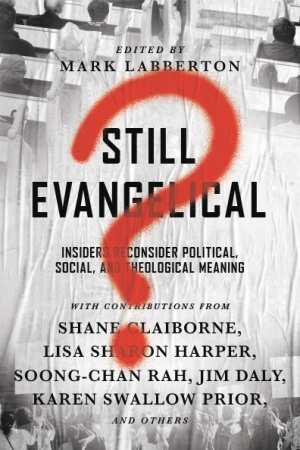Still Evangelical?
Insiders Reconsider Political, Social, and Theological Meaning
- 2018 INDIES Finalist
- Finalist, Religion (Adult Nonfiction)
For the members of the evangelical community left alienated by the current political climate, these essays are a balm.
Still Evangelical? is an olive branch to its own, offering varied, grace-filled perspectives from insiders on the state of evangelical Christianity in the wake of the 2016 presidential election.
Evangelicalism, particularly in America, has garnered a terrible reputation, and this collection of essays from prominent evangelicals attempts to stanch the bleeding. Rather than spending pages lambasting the moral decay of the culture at large, the majority of these writers—a refreshing mosaic of racially diverse men and women—honestly examine both the shortcomings and the boons of this branch of Christianity.
An intriguing historical picture is drawn throughout several of the essays, emphasizing the rise of Jerry Falwell’s Moral Majority as the point at which American evangelicalism became bedfellows with American conservative politics and took a turn for the worse. Mark Young calls this “a tragedy for those who simply cannot hear the gospel through the din of our partisan political engagement.”
Lisa Sharon Harper and Soong-Chan Rah both draw attention to the entrenchment of white evangelicalism that grips Christianity in America. Too often, the voices of people of color are ignored in favor of the influential white men who are perceived as more authoritative. To American Christianity’s detriment, such an attitude misses the rise of evangelicalism among countries and cultures outside the United States and Europe.
Several writers, including activist Shane Claiborne, point out that while American evangelicalism’s image problem does come from very real deficiencies within the religion itself, mass media and social media have both exacerbated this negative portrayal—perhaps unfairly, especially when “evangelical” is often conflated with “fundamentalist.”
While evangelical Christians seek to engage contemporary culture—for better or worse—in an intellectually vigorous way, fundamentalists seek to utterly separate themselves from that same culture. Despite the bad apples that seem to always make headlines, evangelical Christians are not monolithic.
Still Evangelical? is a balanced conglomeration of voices that is more than mere damage control for the often-referenced image problem. The book’s self-critical insights are directed inward to the members of the evangelical community left alienated by the current political climate surrounding the churches and the faith that they hold so dear.
Reviewed by
Meagan Logsdon
Disclosure: This article is not an endorsement, but a review. The publisher of this book provided free copies of the book to have their book reviewed by a professional reviewer. No fee was paid by the publisher for this review. Foreword Reviews only recommends books that we love. Foreword Magazine, Inc. is disclosing this in accordance with the Federal Trade Commission’s 16 CFR, Part 255.

